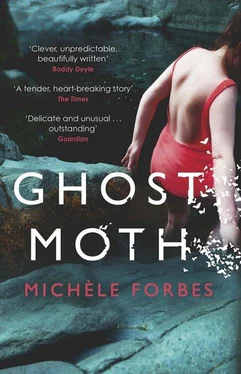Michele Forbes - Ghost Moth
Здесь есть возможность читать онлайн «Michele Forbes - Ghost Moth» весь текст электронной книги совершенно бесплатно (целиком полную версию без сокращений). В некоторых случаях можно слушать аудио, скачать через торрент в формате fb2 и присутствует краткое содержание. Жанр: Современная проза, на английском языке. Описание произведения, (предисловие) а так же отзывы посетителей доступны на портале библиотеки ЛибКат.
- Название:Ghost Moth
- Автор:
- Жанр:
- Год:неизвестен
- ISBN:нет данных
- Рейтинг книги:3 / 5. Голосов: 1
-
Избранное:Добавить в избранное
- Отзывы:
-
Ваша оценка:
- 60
- 1
- 2
- 3
- 4
- 5
Ghost Moth: краткое содержание, описание и аннотация
Предлагаем к чтению аннотацию, описание, краткое содержание или предисловие (зависит от того, что написал сам автор книги «Ghost Moth»). Если вы не нашли необходимую информацию о книге — напишите в комментариях, мы постараемся отыскать её.
Northern Ireland, 1949. Katherine must choose between George Bedford — solid, reliable, devoted George — and Tom McKinley, who makes her feel alive.
The reverberations of that summer — of the passions that were spilled, the lies that were told and the bargains that were made — still clamour to be heard in 1969. Northern Ireland has become a tinderbox but tragedy also lurks closer to home. As Katherine and George struggle to save their marriage and silence the ghosts of the past, their family and city stand on the brink of collapse…
Ghost Moth — читать онлайн бесплатно полную книгу (весь текст) целиком
Ниже представлен текст книги, разбитый по страницам. Система сохранения места последней прочитанной страницы, позволяет с удобством читать онлайн бесплатно книгу «Ghost Moth», без необходимости каждый раз заново искать на чём Вы остановились. Поставьте закладку, и сможете в любой момент перейти на страницу, на которой закончили чтение.
Интервал:
Закладка:
“It’s full of fucking turnips!” he had said, glaring at her red-faced, as though it had somehow been her fault that he had found them. “There must be hundreds of them!”
“Surely not hundreds,” she remembers saying, but George could not be humored.
“I’ll have to grow a bloody new lawn from seed,” he had muttered through jagged breaths, and then had resumed his frantic digging. He had stayed out all evening, until the last lip of daylight had slipped into dusk, and had then worked on into the night. She had called him to come in to eat, but George had insisted he stay outside and dig. So she ate alone.
The rest of the evening was spent quietly unpacking and placing their shared things about the house. In the back room of the house (which opens out into, and is really part of, the kitchen), she installed the two-bar electric fire that had been given to them by her mother, plugging it in to test if it still worked — why wouldn’t it? The little fan whirred above the red bulb and made the light flicker through the scratched painted coal shapes (it was all pretend) and released the smell of heated dust into the evening air. Across the back of the brown leatherette sofa, which they had picked up from a secondhand furniture shop three days before, she placed a gray woolen throw with mint green edges. It slid off the sofa immediately, as easily as syrup off a hot spoon (as she had predicted it would — she remembers having made a mental note to sort it out; she had yet to get around to it). On the brown linoleum, which had been included in the price of the house, she placed a rug with regular little patterns of green-yellow flowers caught in serrated borders of crimson and blue. With some effort, she hung the long, heavy drapes, which she had made herself, either side of the back door, covering its glass with a milky net curtain. The drapes would come in useful for the winter — she realized she was a little ahead of herself hanging them in summer — and she fussed over their tidiness so that they fell on either side of the door like two long pillars of burned honey.
On the mantelpiece above the electric fire she placed a favorite and edge-worn photograph of herself with her father in Tollymore Forest, a place they had regularly visited on holiday when she was a child. Beside it she put an ever so slightly out-of-focus photograph of herself and George on their honeymoon in Mexico. Under a Latin American sun, they stood together, George’s arm placed awkwardly around her shoulders. Their flimsy salt white straw sombreros were pushed back a little on their heads, so that they squinted into the new light with an embarrassed awe.
Finally, after checking that George’s supper was still warm enough, she unpacked a sheet and two blankets and, leaving a light on in the kitchen, took herself up to their cold new bed and lay listening to the thwat-thwat-thwat of the garden spade outside, wishing that the first evening in their new home together had held a little more tenderness.
And the turnips kept coming. Just when George thought he had dug up the last of them, more would appear like stubborn, blank, disembodied heads. They forced their way up through the lawn and flagged their long, slender turnip tops. To her, the turnips were an unexpected harvest, and whether they were boiled, roasted, diced, or mashed, she made sure that every one of them was eaten. “Think of the starving black babies of Africa,” she would say to George as she handed out yet more bowlfuls of turnip.
After many seasons of frenzied digging, the reluctant turnips disappeared, leaving the soil dry-brown and broken. Yet George, for months after, would stalk the garden, head low, like some horticultural vigilante, eyes intent on finding just one more, finding the one he had missed, ready with his spade. She would stand watching him from the kitchen window, see the sweat break out across his forehead and down his temples. He would walk slowly across the stunted earth as though he were trying to stalk and kill something. Buried things that he needed to unearth and destroy. Buried things that he needed to empty himself of. Too many buried things.
In time, the garden became theirs and the grass grew back without George’s having to sow one single seed. It gracefully became a verdant cradle for their young children, Maureen and Elizabeth, where on summer afternoons they would sometimes be found among the long and tender new blades, curled, baby-fleshed, asleep, like soft blackberries having fallen from the bush. Katherine had often said that she would have made pies from them and eaten them. And George had seemed more at ease, more sure of his step. Becoming a father had been good for him, Katherine had thought. Since Maureen and Elizabeth had been born, he had been happier.
It was when Elsa was born, however, that she saw George’s irascibility rise again. More intensely this time. Perhaps because Elsa was born at home, perhaps because of that, she kept telling herself, George had appeared more vunerable and had begun to behave as though he believed that the whole house was under siege.
Outside the window of the bedroom, where she was in labor with Elsa, bees had made a hive. With the impending birth, the busyness of the bees had barely been noticed. But that evening, as contractions began and she felt herself opening, as a freshly healed wound might be opened, reopened, accidentally, irreversibly, the bees night-gathered. She felt the impending force of her baby’s descent as a thousand honey-laden bees hummed a melodious and rhythmical welcome song, a droning lullaby for the buttery baby. Daylight had soberly nudged its way in and Elsa was born. George had stood at the bedside of mother and baby as though he were a visitor in his own house, respectful and distant, his tender attention tempered by puzzlement that he could father a child so fair, so golden.
After the birth — her thighs blood-streaked and purposeless from the long labor — Katherine had wept from exhaustion and joy and had kissed the blue-hued skin of her pointy-headed baby. But George, it seemed, could only worry about the bees.
“The bees have to be killed; the hive has to be destroyed,” George had announced with a defiant anger.
“Bees? What bees?” Katherine had said, holding their new baby, the cadences of labor still fresh and warm.
And so the bee killer had been called in to smoke the bees out, a little man in a big hat. “I’ll put on my bee suit for protection,” the man had said to George like a child reading aloud, as though, in a final act of courtesy, he himself dressed up as a bee to do the deed.
For weeks after Elsa’s birth, dead bees could be found all over the house, singular, sad, furry, redundant cases. Their still wings a thin transparent film, the color of gently caramelized onion. Light, dried bodies semaphorically cut short and with the quietness of their purpose frozen. They lay around the house in corners, behind cupboards, reminders of a cruel and unnecessary demise. Some were even found outside, scattered by the fuchsia bush that grew by the coal shed. Under the cardinal purses of sickly nectar, they were little dark dots of death.
By eight o’clock, Stephen is settled and Maureen and Elizabeth have their faces washed, their teeth brushed, and are clambering willingly into bed. The paper blind in their bedroom is pulled closed, but the curtains are left open so they can still see in the milky evening light without having to turn on their bedside lamp.
Unusually, no decade of the Rosary is said that evening. Katherine has seen clearly, despite the curtailment of the picnic, how tired the day has made them all. She herself feels curiously emptied.
Before she goes in to say good night to the girls, Katherine slips into her own bedroom, taking care not to wake Stephen, who is fast asleep in his cot in the corner of the room. She tidies away the towels and her white swimsuit, which she had left on the floor (she had had to find her warmest clothes to wear, so chilly had she felt since her swim). She kneels and picks up the broken pieces of the statuette, which are still lying by the wardrobe, and wraps them in the paper that has the lyrics from Carmen written on it. She places the paper parcel back inside the box and she covers the box with the cloth. She places it deep in at the back of the wardrobe and closes the wardrobe door. But this time, the statuette doesn’t feel hidden enough. It still feels visible. Present. If she had a key for the wardrobe door, she would lock it. Keeping everything in. Layer upon layer. Skin upon skin.
Читать дальшеИнтервал:
Закладка:
Похожие книги на «Ghost Moth»
Представляем Вашему вниманию похожие книги на «Ghost Moth» списком для выбора. Мы отобрали схожую по названию и смыслу литературу в надежде предоставить читателям больше вариантов отыскать новые, интересные, ещё непрочитанные произведения.
Обсуждение, отзывы о книге «Ghost Moth» и просто собственные мнения читателей. Оставьте ваши комментарии, напишите, что Вы думаете о произведении, его смысле или главных героях. Укажите что конкретно понравилось, а что нет, и почему Вы так считаете.












